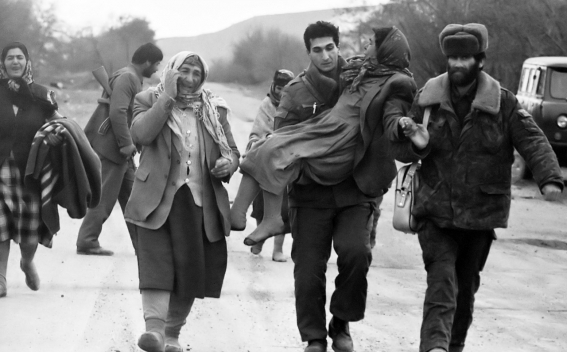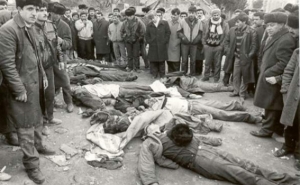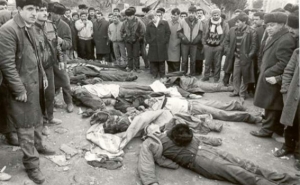Khojaly: It was a War

There is a famous saying "raisins are not being given at war", which in fact reflects a lot of the realities of war. And today, when it comes to the atrocities in the course of this or that war, you realize how wild the word "murder" sounds here - especially that of children, women and old people. However, the word "murder" always sounds wild - even when it is used as self-defense.
Sometimes, however, there are exceptions that do not happen in everyone's life, but only in the lives of those who survived the war. During the war, the murder and death cease to be something wild, they turn into something ordinary - not less terrible, but still ... Those who have not experienced such "military routine" do not believe to this and even now, after many years of the Karabakh war, it seems that there was not such a thing and that people cannot get used to death and lose their human qualities. But no - the war really takes away from the people not only the right to life and its many charms (tap water, electricity, bread, communication, etc...), but also it takes away from people the most important thing - the human face and the human soul. And today, if you remember the war, talk about it to assess the actions of certain people, it is worth remembering: you cannot judge those or other acts committed during the war, according to today's "peaceful" laws. Because then people were not humans, they were only people-instincts who cared only about one thing - to survive...
All this is written in the context of today, February 26, the day that the Azerbaijanis call "Khojaly tragedy", the Armenians call "Khojaly operation". In fact, everything that happened in Khojaly should be seen in the overall chain of events of the war in Karabakh, because it is impossible to separately consider the links in a chain - a causal relationship is too strong in this case. And as it is impossible today to tell only that there were atrocities of the Armenians in Khojaly (without going into the details and background of what had happened after 1988 in Karabakh), it is also impossible to talk about the fact that the responsibility for Khojaly is only on Azerbaijanis, who "deported not people, but animals". Rather, the responsibility for what happened must take those people who unleashed a terrible knot of war, because it was them who turned people into no-humans capable of killing...
There is a chronology, according to which arriving of the Armenian military forces in the Azerbaijani town of Khojaly was predetermined by the strategic location of the city, and by the regular shelling that took place in Khojaly in the direction of Armenian villages. There was a serious war, during which, as you know, one attacked - the other protected. Sometimes there was a change of position, but all involved in the Karabakh war realized then that they would either live or die. And they could wait for anything as it was war...
British journalist Thomas de Waal describes the beginning of the "Khojaly operation": "The assault began on the night of February 25 to 26. This day was probably chosen in memory of the Armenian pogroms in Sumgait, occurred four years earlier". According to him, killed civilians in Khojaly were not a part of the planned deliberate action, "I do not think it was intentional. I think that in any war events occur very quickly, spontaneously. I do not think that it was a deliberate action, approved by the above. I think that it was a war, it was a very chaotic situation"...
According to the NKR officials, a "free corridor" was left to get the civilian population out of Khojaly, which started from the eastern outskirts of the city, went along the river and to the north-east, leading in the direction of Agdam, leaving Askeran on the left. The width of the corridor was 100-200m, and in some places up to 300m. The members of the Armenian armed forces promised not to fire the civilians and members of the Azerbaijani military forces that carried no weapons through this "corridor".
According to the NKR officials, at the beginning of the assault Khojaly population was informed of the presence of such a "corridor" with the help of speakers mounted on armored personnel carriers. However, those who reported this information, did not rule out that a large part of the population of Khojaly could not hear reports of "free corridor" because of shooting and low-power speakers. Of those 60 people surveyed by the Russian human rights organization "Memorial" who fled from Khojaly during the assault on the city, only one told he was aware of the existence of a "free corridor" (he was told by a military from Khojaly garrison). Meanwhile, a few days before the storming, the representatives of the Armenian side has repeatedly used radio communication, informing the authorities about the impending assault of Khojaly and called them to immediately withdraw the population of the city. The fact that this information was obtained by the Azerbaijani side and transferred to Baku, was confirmed in the publications of the Baku newspapers ("Baku Worker").
The existence of "corridor" is also indicated with the words of the chief executive of Khojaly Elman Mamedov, who is quoted in the newspaper "Russian idea" (03.04.92): "We knew that this corridor was designed to release the civilian population ..." But, apparently, the information on the presence of "free corridor" was not told to the bulk of the inhabitants of Khojaly.
In an interview with the Czech journalist Dana Mazalova (published in "Nezavisimaya Gazeta" 2 April 1992) then retired President of Azerbaijan Ayaz Mutalibov blamed for the crime the opposition which was seeking his resignation. The question "What do you think about the events in Khojaly, after which you resigned? The corpses of Khojaly people were found not far from Aghdam. Someone first shot them in the legs so that they could not withdraw further. Then they finished off with an ax. On February 29, my colleagues filmed them. During the shootings of March 2 the same bodies were scalped. What a strange game ..." Mutalibov in response said "According to those people of Khojaly, who were saved, it was all organized to make an excuse for my resignation. It was some kind of power that acted to discredit the president. I do not think that Armenians, who very clearly and competently relates to such situations, could allow Azerbaijanis to receive the documents exposing them in their fascist actions. It can be assumed that someone was interested in later showing these cadres during the session of armed forces and to focus everything on my person ..."
In 2005 a partial responsibility of the anti-Mutabilov Popular Front of Azerbaijan for Khojali victims was confirmed in the article of Azeri journalist, head of the portal haqqin.az, Eynulla Fatullayev: "After reviewing the geographical terrain, with full conviction I can say that speculation about the absence of Armenian corridor are groundless. Corridor indeed existed. Otherwise completely surrounded and isolated from the outside world Khojaly people would not be able to break through the ring and get out of the blockade. However, breaking the area across the river Karkar, a the refugees split, and some of the people headed towards Nakhijevan. It seems that APF battalions sought not to the liberation of Khojaly, but to greater blood on the way of overthrowing Mutalibov"...
According to the "Memorial", "the NKR Supreme Council issued a statement which expressed its regret about the cases of violence in the capture of Khojaly." In conversations with the observers of "Memorial", the officials denied that by the capture of Khojaly the atrocities may have occurred, as among members of Armenian armed units they were angry people whose relatives were killed by Azerbaijanis, as well as people with criminal records, angry with the killings of innocent Armenians in Sumgait, Baku, Kirovabad, and so on.
Today, Armenians and Azerbaijanis can really argue on the topic "Was there a corridor for the civilians or not?" or "Who was more violent in the war?" However, from the height of peaceful years it is really very difficult to estimate the chaos and psychological picture of those years and the actions that Azerbaijanis committed against the Armenians and vice versa - the Armenians against the Azerbaijanis. It was really a war, about which it may be worth talking to its participants, those who overestimated their participation in the war, regained the "human face". With this we will not return the lost lives, we will not change the history, but that such a re-evaluation both for Armenians and Azerbaijanis will lead to using the word "war" with more caution.
-
 17:08
17:08The regular session of the Anti-corruption Policy Council takes place in Jermuk
-
 15:05
15:05The Prime Minister sends congratulatory messages to the supreme leader of Iran and the President of Iran
-
 11:11
11:11Armenia sends earthquake aid to Turkey
-
 10:43
10:43Commemoration of the Pontiff St. Sahak Partev
-
 09:16
09:16Some roads are closed and difficult to pass in Armenia
-
 19:55
19:55Phone conversation of the Foreign Minister of Armenia with the U.S. Assistant Secretary of State for European and Eurasian Affairs
-
 18:30
18:30Prime Minister Pashinyan and President Khachaturyan meet
-
 18:20
18:20Ararat Mirzoyan with Co-Chairman of the OSCE Minsk Group of France Brice Roquefeuil
-
 17:01
17:01Humans could land on Mars within 10 years, Musk predicts
-
 16:45
16:45France, US urge 'immediate' end to Nagorno Karabakh blockade
-
 16:01
16:01Blockaded Nagorno Karabakh launches fundraiser to support quake-hit Syria
-
 15:59
15:59Earthquake death toll in Turkey rises to 18,342
-
 15:43
15:43Ararat Mirzoyan Held a Telephone Conversation with Sergey Lavrov
-
 15:06
15:06French president rules out fighter jet supplies to Ukraine in near future
-
 14:47
14:475 Day Weather Forecast in Armenia
-
 14:44
14:44President Vahagn Khachaturyan wrote a note in the book of condolences opened in the Embassy of Syria in Armenia
-
 14:20
14:20Azerbaijan’s provocations impede establishment of peace and stability – Armenian FM tells Russian Co-Chair of OSCE MG
-
 12:57
12:57France representation to OSCE: Paris calls on Azerbaijan to restore freedom of movement through Lachin corridor
-
 11:40
11:40Command of Kosovo forces highly appreciated preparation of Armenian peacekeepers
-
 10:16
10:16The United States withdrew from sanctions against Syria for six months the provision of assistance after the earthquake
day
week
month
Humidity: %
Wind: km/h




